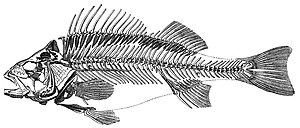Marine vertebrates are vertebrates that live in marine environments, which include saltwater fish (including pelagic, coral and deep sea fish) and marine tetrapods (primarily marine mammals and marine reptiles, as well as semiaquatic clades such as seabirds). As a subphylum of chordates, all vertebrates have evolved a vertebral column (backbone) based around the embryonic notochord (which becomes the intervertebral discs), forming the core structural support of an internal skeleton, and also serves to enclose and protect the spinal cord.
Compared to other marine animals, marine vertebrates are distinctly more nektonic, and their aquatic locomotions rely mainly on propulsion by the tail and paired appendages such as fins, flippers and webbed limbs. Marine vertebrates also have a far more centralized nervous system than marine invertebrates, with most of the higher functions cephalized and monopolized by the brain; and most of them have evolved myelinated central and peripheral nerve system, which increases conduction speeds significantly. The combination of endoskeleton (which allows much larger body sizes for the same skeletal mass) and a more robust and efficient nervous system (which enables more acute perception and more sophisticated motor control) gives vertebrates much quicker body reactivity and behavioral adaptability, which have led to marine vertebrates dominating most of the higher-level niches in the marine ecosystems.

